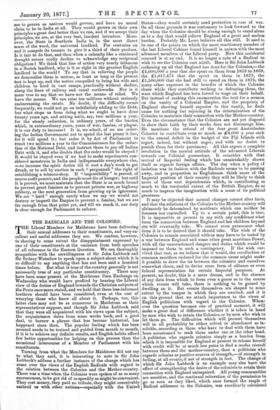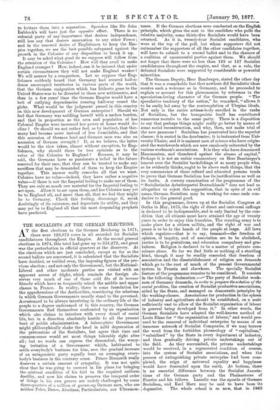THE RADICALS AND THE COLONIES.
THE Liberal Members for Maidstone have been delivering their annual addresses to their constituents, and very ex- cellent and useful addresses they are. We confess, however, to sharing to some extent the disappointment expressed by one of their constituents at the omission from both speeches of all reference to the Eastern Question. We can thoroughly sympathise with the unwillingness of Sir John Lubbock and Sir Sydney Waterlow to speak upon a subject about which it is so difficult to say anything that has not been said a hundred times before. But what is true of the country generally is not necessarily true of any particular constituency. There may have been some present at the Maidstone Corn Exchange on Wednesday who would have profited by hearing the Liberal view of the duties of England towards the Christian subjects of the Porte once more stated, and we hold that these less-informed brethren should have been considered, even at the cost of wearying those who knew all about it. Perhaps, too, this latter class may not be as numerous in Maidstone as their representatives suppose, and though Sir John Lubbock said that they were all acquainted with his views upon the subject, the acquaintance dates from some weeks back, and a good deal, to borrow a phrase that has become historical, has happened since then. The popular feeling which has been aroused needs to be trained and guided from month to month, if it is to achieve any definite results, and English habits afford few better opportunities for helping on this process than the occasional intercourse of a Member of Parliament with his constituents.
Turning from what the Members for Maidstone did not say to what they said, it is interesting to note in Sir John Lubbock's address a further instance of the change which has come over the views of the English Radicals with regard to the relation between the Colonies and the Mother-country. There was a time when the Colonies were spoken of as so many excrescences, to be got rid of as speedily as might be convenient. They cost money, they paid no tribute, they might conceivably embroil us with other nations--especially with the United
States—they would certainly need protection in case of war. On all these grounds it was customary to look forward to the day when the Colonies should be strong enough to stand alone as to a day that would relieve England of a great and useless burden. Probably Mr. Lowe believes all this still. It used to be one of the points on which the most reactionary member of the last Liberal Cabinet found himself in unison with the most advanced members of the Liberal party. Now this accidental concord is at an end. It is no longer a note of a Radical to wish to see the Colonies cast adrift. Here is Sir John Lubbock reckoning up all that England has done for the Colonies,—the £4,000,000 a year that she spent on them from 1859 to 1869, the £1,817,471 that she spent on them in 1873, the £1,500,000 that she had still to spend on them in 1875, the many other expenses in the benefits of which the Colonies share while they contribute nothing to defraying them, the wars which England has been forced to wage on their behalf. But instead of making this enumeration the text for a sermon on the vanity of a Colonial Empire, and the propriety of England showing herself superior to this vanity, he finds cause for nothing but rejoicing in the determination of the Colonies to maintain their connection with the Mother-country. Even the circumstance that the Colonies are not yet disposed to show their faith by their works does not discourage him. He mentions the refusal of the four great Australasian Colonies to contribute even so much as £4,000 a year each to the annual deficit in the budget of the Fiji Islands with regret, indeed, but without anger, and with no desire to punish them for their parsimony. All this argues a complete revolution in the mental attitude of the advanced Liberals towards our Colonial possessions. It coincides with that revival of Imperial feeling which has unmistakably shown itself as regards foreign affairs. The day when a policy of isolation was in fashion with the Radicals seems to be passing away, and in proportion as Englishmen think more of the Imperial position of their country they will be likely to think more of those vast dependencies which, in contributing so much to the territorial extent of the British Empire, do so much to impress the imagination with a sense of its political greatness.
It may be objected that mental changes cannot alter facts, and that the relations of the Colonies to the Mother-country will ultimately be determined by accidents which can neither be foreseen nor controlled. Up to a certain point, this is true. It is impossible at present to say with any confidence what form the connection between England and her children beyond sea will eventually take. We cannot even pronounce what form it is to be desired that it should take. The wish of the Colonies to remain associated with us may have to be tested by a war between England and some other great maritime Power, with all the unaccustomed dangers and duties which would be imposed on them in such a contingency. If the wish sur- vived that test, as we believe that it would, the recollection of common sacrifices endured for the common cause might make it possible to draw the tie between the colonists and ourselves somewhat closer, and to devise some form of alliance or even federal representation for certain Imperial purposes. At present, no doubt, this is a mere dream, and in the absence of any data from which to form even a guess as to the course which events will take, there is nothing to be gained by dwelling on it. But events themselves are shaped to some extent by the temper in which they are awaited, and it is on this ground that we attach importance to the views of English politicians with regard to the Colonies. When- ever the question becomes one of practical moment, it will make a great deal of difference whether it is taken in hand by men who wish to retain the Colonies, or by men who wish to let them go. The difficulties which will present themselves will in all probability be either solved or abandoned as in- soluble, according as those who have to deal with them have been accustomed to rank them under one or the other head. A politician who regards colonies simply as a burden from which it is impossible for England at present to release herself with credit will be at much less pains to find a modus vivendi between them and the mother-country, than a politician who regards colonies as positive sources of strength,—of strength in feeling, at all events, if not of strength in fact. The change of which Sir John Lubbock is an example may also have the effect of strengthening the desire of the colonists to retain their connection with England unimpaired. All young communities are sensitive, and the continual reiteration of the permission to go as soon as they liked, which once formed the staple of Radical addresses to the Colonies, was excellently calculated
to irritate them into a separation. Speeches like Sir John rattbbock's will have just the opposite effect. There is no Colonial party of any importance that desires independence, still less any that desires annexation to any other Power ; and in the renewed desire of Englishmen to keep the Em- pire together, we see the best possible safeguard against the growth in the Colonies of any disposition to break it up. It may be asked what good do we suppose will follow from the retention of the Colonies V How will they avail to make England stronger f How, indeed, can it be -insured that under certain circumstances they will not make England weaker ? We will answer by a comparison. Let us suppose that Eng- lishmen suddenly heard that Germany had secured half-a- damn unoccupied territories in various parts of the world, that the German emigration which has hitherto gone to the United States was to be diverted to these new settlements, and then in a few years' time the German Empire would have a belt of outlying dependencies running half-way round the globe. What would be the judgment passed in this country on this new development of German enterprise ? Should we feel that Germany was saddling herself with a useless burden, and that in proportion as the area and population of her Colonial Empire were increased her power at home would de- cline ? Or should we not rather feel, as by instinct, that Ger- many had become more instead of less formidable, and that this accession of German land and German men was also an accession of German strength ? If, as we believe, the latter would be the view taken, almost without exception, by Eng- lishmen, why should there be two opinions as to the value of the Colonies to England ? Because, it may be said, the Germans have so passionate a belief in the future reserved for their race, that they can be trusted to make any sacrifices that may be demanded of them to keep the Empire together. This answer really concedes all that we want. Colonies have no value—indeed, they have rather a negative value—if there is not the Imperial feeling to make use of them. They are only so much raw material for the Imperial feeling to act upon. Allow it to act upon them, and her Colonies may yet be to England all, and more than all, that we feel they might be to Germany. Check this feeling, discourage it, speak doubtingly of its existence, and depreciate its utility, and they may yet be to England all that the most desponding prophets have predicted.



































 Previous page
Previous page